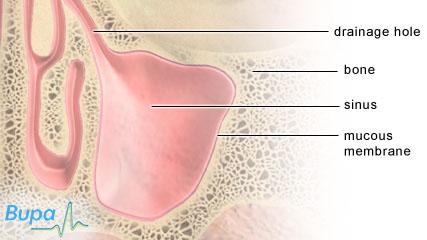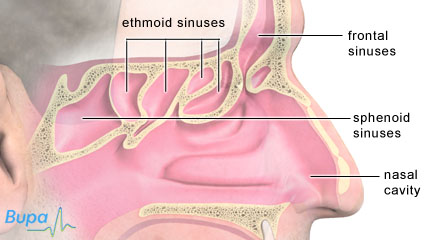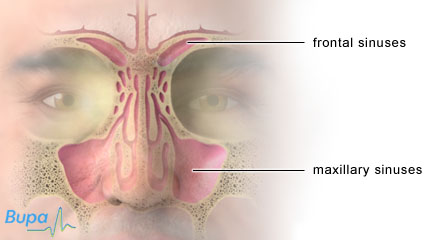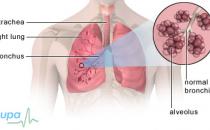Sinusitis

Sinusitis is inflammation of the linings of the sinuses that surround the nose. Common symptoms include a tender face and a blocked nose. It's often caused by an infection.
Where the sinuses are found
About sinusitis
Symptoms of sinusitis
Causes of sinusitis
Diagnosis of sinusitis
Treatment of sinusitis
Where the sinuses are found
http://hcd2.bupa.co.uk/fact_sheets/html/sinusitis.html
About sinusitis
What are sinuses?
The sinuses are air-filled spaces within the bones of your face that open up into the nasal cavity. They are lined with the same membrane as your nose. This lining is called the mucous membrane and it produces a slimy secretion called mucus to keep the nasal passageways moist and to trap dirt particles and bacteria.
You have four main pairs of sinuses:
- The maxillary sinuses are in each cheekbone.
- The frontal sinuses are on either side of your forehead, above your eyes.
- The smaller ethmoid sinuses are behind the bridge of your nose, between your eyes.
- The sphenoid sinuses are between the upper part of your nose and behind your eyes.

The location of the frontal, ethmoid and sphenoid sinuses

The location of the frontal and maxillary sinuses
What is sinusitis?
Sinusitis is inflammation of the lining of one or more of your sinuses.
If your sinusitis lasts less than eight weeks (or less than 12 weeks in a child) it's called acute sinusitis. If your sinusitis lasts three months or more you may have chronic sinusitis. This is where the lining in your nose and sinuses is thickened and constantly inflamed. The medical terms acute and chronic refer to how long the condition lasts for, rather than how severe it is.

A maxillary sinus
Symptoms of sinusitis
If you have sinusitis your symptoms may include:
- pain and pressure in your face, which is worse when you lean forwards
- a blocked nose with green or yellow mucus, which can drain down the back of your nose into your throat and may cause a sore throat and cough
- a headache
- less common symptoms of sinusitis include tiredness, a reduced sense of smell, bad breath (halitosis) and a fever
The pain you have will depend on which of your sinuses are affected.
- Frontal sinusitis can cause pain just above your eyebrows, and your forehead may be tender to touch.
- Maxillary sinusitis can cause your upper jaw, teeth and cheeks to ache and may be mistaken for toothache.
- Ethmoid sinusitis can cause pain around your eyes and the sides of your nose.
- Sphenoid sinusitis can cause pain around your eyes, at the top of your head or in your temples. You may also have earache and neck pain.
On very rare occasions, a sinus infection can spread to the bones of the face or the membranes lining the brain. Also very rarely, sinusitis can spread to form a pocket of pus (abscess) in the eye socket, the brain or a facial bone. If you develop swollen eyelids while you have sinusitis you should see your GP immediately.
Causes of sinusitis
Sinusitis is often caused by an infection of the mucous membranes with a virus, bacterium or fungus. Most people with acute sinusitis have had a viral infection such as the common cold. During a cold the mucous membranes become swollen and tend to block the openings of the sinuses.
Irritants and allergens can inflame the linings of your nose and sinuses, causing sinusitis. Some examples of irritants include:
- airborne allergens such as grass and tree pollen
- smoke and air pollution
- sprays containing chemicals (eg household detergents)
Enlarged adenoids and growths on the mucous membranes, such as nasal polyps, may block the openings to the sinuses and cause sinusitis.
People with certain medical conditions, such as cystic fibrosis, are more likely to get sinusitis.
Diagnosis of sinusitis
Your GP will ask you about your symptoms and will examine you. He or she may also ask you about your previous illnesses and operations.
Your GP will usually be able to diagnose acute sinusitis just from examining you and no further medical tests are usually necessary.
If you have chronic sinusitis and if your treatments haven’t worked, your GP may refer you to a doctor who specialises in ear, nose and throat conditions. You may have an X-ray to help determine the cause of your chronic sinusitis. The specialist may recommend a nasendoscopy (also known as nasal endoscopy), where he or she will insert a small, flexible tube with a light and a camera lens at the end (endoscope) into your nostril to look at the inside of your sinuses.
Treatment of sinusitis
Most people with acute sinusitis get better without treatment. However, if your symptoms continue for more than a week, or seem to be worsening, you may wish to see your GP.
Self-help
Some people find that breathing in steam from a bowl of hot (but not boiling water) provides some relief from the symptoms. However, this isn’t scientifically proven. Try sitting in your bathroom with the hot shower running. Putting a warm flannel on the areas of your face that are painful and sleeping with your head and shoulders propped up with pillows may help, but there is no scientific evidence that this works.
There is some evidence that using salt-water nasal sprays or drops may help with the symptoms of chronic sinusitis. These are available from pharmacies without a prescription.
Medicines
Over-the-counter painkillers such as ibuprofen or paracetamol may relieve pain and bring your temperature down if you have a fever. Always read the patient information leaflet that comes with your medicine and ask your pharmacist or doctor for advice.
Several nasal sprays are available over-the-counter and on prescription from your GP. These include decongestants (eg Sudafed) and mild steroids (eg Beconase). Your GP or pharmacist can recommend the most appropriate remedies for you.
If your GP thinks your sinusitis is caused by a bacterial infection, or you develop a secondary bacterial infection due to your inflamed sinuses, he or she may prescribe antibiotics. However, research shows that eight out of 10 people with acute sinusitis get better within two weeks without antibiotics.
If you have sinusitis and an allergy then you may find that controlling your allergy helps to reduce the symptoms of your sinusitis. Antihistamine tablets such as loratadine (eg Clarityn) may help to do this.
Surgery
If you have chronic sinusitis that doesn't get better with home or medical (drug) treatments, your specialist may suggest that you to consider surgery.
In functional endoscopic sinus surgery (FESS) the surgeon washes out the sinuses and widens the drainage holes using an endoscope. This can be done under local or general anaesthesia.
Other types of surgery can remove nasal polyps or correct an obstruction in the nose that may be the cause of your sinusitis. Ask your doctor for more information about the different types of surgery, as all types of surgery carry the risk of complications and side-effects.
This section contains answers to common questions about this topic. Questions have been suggested by health professionals, website feedback and requests via email.
Can I fly if I have chronic sinusitis?
Is sinusitis contagious?
I've had sinusitis for a few days and have noticed the area around my eye is getting red and puffy. What should I do?
Can I fly if I have chronic sinusitis?
Flying can cause sinus pain so you may not wish to fly if you're going through a bad patch with chronic sinusitis. However, using decongestants and nasal sprays may relieve your symptoms enough for you to be able to fly more comfortably.
Explanation
When you go up in a plane the air pressure is lower than on the ground. You may have noticed that a bottle of water expands as the plane gets higher and will give a hiss of air escaping when you open it. This is because the air that was sealed inside when you were on the ground expands when the air pressure outside is reduced. The same thing happens to the air inside your sinuses. Usually the expanded air flows out through your sinuses so the air pressure inside them is the same as that of the surrounding air. This is called equalising. However, if your sinuses are inflamed, the air may be trapped inside and expand against the walls of your sinuses causing pain that can be very severe. You may get a headache or facial pain. In extreme circumstances the expanding air can cause bleeding inside your sinuses or may damage some nearby nerves.
If you have chronic sinusitis, you may also have problems when the plane lands. If air doesn't flow into your sinuses on landing, the air trapped inside takes up less space. This may cause painful ‘sucking’ on your sinus walls.
Using nasal decongestant drops or a spray such as oxymetazoline may help your sinuses to equalise. Oral decongestants may help too, however, you shouldn't use these if you have high blood pressure or heart disease. If you have allergies that make sinusitis worse, make sure they are under control. See your GP or pharmacist for advice. If you do fly but get ongoing pain afterwards for more than one or two days, or if your symptoms get worse, you should see a GP.
It may be hard for you or your GP to know for sure whether your sinusitis is going to be a problem when flying. If you know that you have difficulty equalising the pressure in your sinuses, you may decide that it's better not to fly.
Is sinusitis contagious?
No, sinusitis isn't contagious.
Explanation
Sinusitis isn't contagious, but the cause of it can be. The most common cause of sinusitis is a cold or flu. When you have a cold or the flu virus, your sinuses can get inflamed and this can stop mucus draining properly away from them. This can then lead to a secondary bacterial infection, which can cause further inflammation and swelling.
If you or a member of your family has a cold, try to avoid spreading the virus by:
- covering your mouth when you cough or sneeze
- washing your hands frequently and drying them properly
- putting used tissues in the bin straight away
You may also want to discourage your children from sharing toys if one of them has a cold or the flu and wash any toys in soapy water after use.
I've had sinusitis for a few days and have noticed the area around my eye is getting red and puffy. What should I do?
If you have an infection in your sinuses, particularly ethmoid sinusitis, it can spread to your eye socket and the surrounding area. This can be a serious complication of acute sinusitis and you should seek medical treatment as soon as possible.
Explanation
Mostly sinusitis gets better without any problems, often without any specific treatment. However, more serious problems can develop if the infection spreads to the parts of your face and skull that are nearby, including the eye sockets and brain. The infection can also spread into surrounding bone and blood.
If you have sinusitis and develop swelling or redness around your eye, your eye appears to be bulging, or your vision gets worse (such as seeing double), this could be a sign that the area around your eyeball has become infected. This is called orbital cellulitis. If you don't get treatment quickly, it could lead to serious problems, including blindness and meningitis. Treatment may include an antibiotic injection or surgery to drain the swelling if it’s likely to permanently affect your vision.
The sinuses are very close to the protective coatings of your brain and infection can spread there. This is called meningitis. Seek urgent medical attention if you develop any of the following symptoms in addition to your sinusitis:
- a severe headache with a stiff neck
- confusion and drowsiness
- sensitivity to light
- coordination problems
- vomiting and diarrhoea
Further information
-
The British Association of Otorhinolaryngologists (ENT-UK)
020 7404 8373
www.entuk.org
Sources
- Sinusitis. ENT UK. www.entuk.org, accessed 11 December 2009
- Zalmanovici A, Yaphe J. Intranasal steroids for acute sinusitis. Cochrane Database of Systematic Reviews 2009, Issue 4. DOI: 10.1002/14651858.CD005149.pub3
- Sinus infection (Sinusitis). National Institute of Allergy and Infectious Diseases. www.niaid.nih.gov, accessed 11 December 2009
- Simon C, Everitt H, van Dorp F. Oxford handbook of general practice. 3rd ed. Oxford: Oxford University Press, 2010
- Harvey R, Hannan SA, Badia L, et al. Nasal saline irrigations for the symptoms of chronic rhinosinusitis. Cochrane Database Syst Rev 2007, Issue 3. DOI: 10.1002/14651858.CD006394.pub2
- Ahovuo-Saloranta A, Borisenko OV, Kovanen N, et al. Antibiotics for acute maxillary sinusitis. Cochrane Database Syst Rev 2008, Issue 2. DOI: 10.1002/14651858.CD000243.pub2
Related topics
- Adenoid removal in children
- Cystic fibrosis
- Antibiotics
- Antihistamines
- Common cold
- Endoscopic sinus surgery
- Nasal polyps
- Sinusitis















